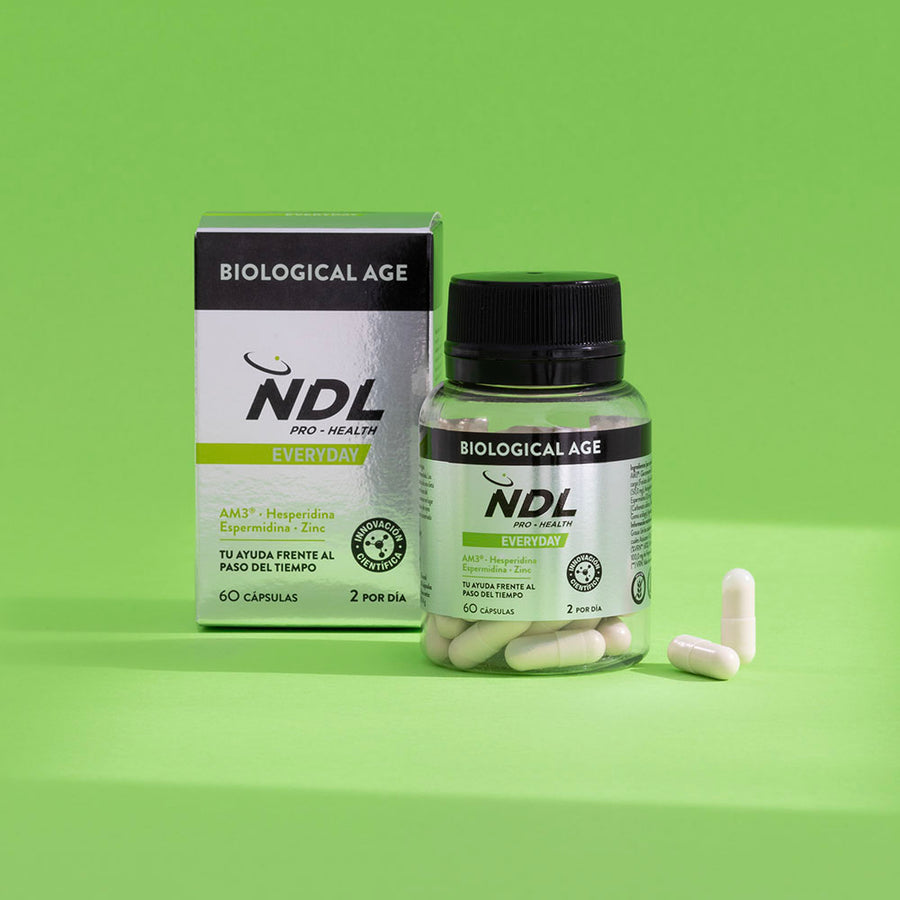Featured Products

Biological Age
See productIn recent years, science has focused its attention on a natural molecule with a little-known name, but with extraordinary potential: spermidine.
Naturally present in our bodies and in certain foods, this substance has aroused the interest of researchers for its ability to promote cellular longevity and contribute to the maintenance of health at the molecular level.
Recent studies link it to key processes such as autophagy, a kind of "internal cleansing" that helps cells to renew themselves and function properly. Thanks to this, spermidine is beginning to be considered an ally in the prevention of premature aging and in the improvement of functions such as cardiovascular and brain health.
In this article we explain what spermidine is, what it is used for, what foods it is found in and how it can benefit your general well-being?
What spermidine is?
Spermidine is a natural polyamine, i.e. an organic molecule involved in multiple essential cellular processes. It is known to be present in virtually all living cells, including plants, bacteria and animals.
Our body produces spermidine naturally, but we also obtain it through food. Its most prominent function is to promote autophagy, a cellular mechanism by which the body eliminates waste, repairs damage and recycles old or defective components. This process is key to maintaining cellular health and preventing aging-related diseases.
In addition to its role in autophagy, spermidine is involved in the regulation of cell growth, DNA stability and protection against oxidative stress, making it a compound of great interest to medical and nutritional science.
What is spermidine used for?
Spermidine, as we have already mentioned, fulfills key functions in the body that make it a fundamental molecule for long-term health. Here are some of the main benefits attributed to spermidine, backed by scientific research:
- Promotes cellular longevity: by stimulating autophagy, spermidine helps keep cells "younger" and more functional longer, which has been linked in studies to longer life expectancy in animal models.
- Supports cardiovascular health: some studies have found that regular consumption of spermidine is associated with a reduced risk of heart disease, thanks to its protective action on blood vessels and blood pressure.
- Supports brain function: spermidine may contribute to the prevention of cognitive decline, as it protects neurons form oxidative damage and promotes cellular clearance processes in the brain, which is important in diseases such as Alzheimer's disease.
- Reduces oxidative stress and inflammation: thanks to its indirect antioxidant effect, spermidine helps reduce cell damage caused by free radicals, which contributes to slowing down chronic inflammatory processes related to multiple diseases.
In summary, spermidine acts as a potent modulator of cellular aging and could play a relevant role in the prevention of chronic diseases associated with the passage of time.
Where is spermidine found?
Spermidine is present both in our body and in various plant and animal foods. However, over time, the natural levels of spermidine in the body tend to decrease, so a diet rich in this molecule can help compensate for this loss and maintain its cellular benefits.
Foods rich in spermidine: sprouted wheat (specially concentrated extract), fermented soybeans (such as Japanese natto), cured cheeses, mushrooms (mushrooms, shiitake), broccoli, cauliflower, apples, peas or chicken liver.
Including these foods regularly in the diet can help increase spermidine levels naturally.
Spermidine supplements: due to growing interest in its effects on longevity and cellular health, spermidine is also available in the form of nutritional supplements, usually extracted from sprouted wheat. These products are often found in capsules and in different concentrations, and are used in anti-aging health programs or as part of cellular wellness routines.

Is spermidine supplementation safe?
Spermidine supplementation has been the subject of several studies in recent years. So far, clinical trials and scientific reviews indicate that spermidine is well tolerated in moderate doses and has no significant adverse effects in healthy adults.
Safety and clinical studies:
In human studies, daily doses ranging from 0.9 to 3 mg of purified spermidine, usually extracted from sprouted wheat, have been used.
As with any supplement, the ideal is to customize the dose and evaluate whether it is really necessary, based on health status, diet and personal goals.
In conclusion, spermidine is a natural compound with enormous potential to improve cellular health and slow aging.Its ability to activate autophagy, protect the heart, support brain function and reduce oxidative damage makes it a nutrient of great interest in the field of preventive nutrition and longevity.
While its full long-term effects are still being studied, current data are promising. Incorporating spermidine-rich foods or considering supplementation may be a positive step for those seeking to optimize their well-being from within.

From the NDL Pro-Health team we will provide you with tips to maintain a healthy lifestyle. Sharing knowledge and product recommendations to offer optimal solutions for your daily routine, for your workouts and subsequent recovery, all with the goal of helping you achieve physical and mental wellness.

















